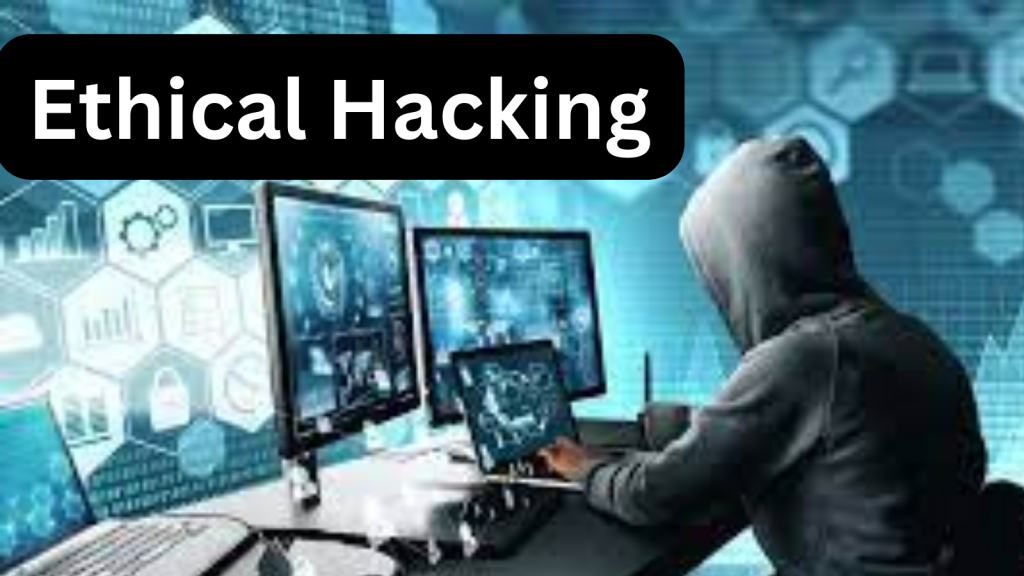What is Ethical Hacking?
Table of Contents

Ethical hacking, also known as penetration testing or white hat hacking, refers to the practice of testing computer systems, networks, or web applications for security vulnerabilities. Ethical hackers use the same techniques and tools as malicious hackers, but with the permission of the organization or owner of the system being tested. The goal of ethical hacking is to identify and fix security weaknesses before malicious hackers can exploit them. This proactive approach helps organizations strengthen their security posture and protect their sensitive data from cyber threats. Ethical hacking is an important component of overall cybersecurity efforts.
What is Hacking? Introduction & Types

Hacking is the unauthorized access, modification, or manipulation of computer systems, networks, or data. It can involve exploiting security vulnerabilities to gain access to sensitive information, disrupt operations, or cause damage to the targeted system.
There are several types of hacking, including:
1. Ethical Hacking:
Also known as penetration testing, ethical hacking involves authorized professionals attempting to breach a system’s security to identify vulnerabilities and improve its defenses.
2. Black Hat Hacking:
This refers to malicious hacking carried out by individuals or groups with the intent to steal data, disrupt operations, or cause harm for personal gain or malicious purposes.
3. Grey Hat Hacking:
Grey hat hackers operate in a middle ground between ethical and black hat hacking. They may break into systems without authorization but do so without malicious intent, often to expose vulnerabilities and prompt improvements in security.
4. Phishing:
This involves tricking individuals into revealing sensitive information, such as passwords or financial details, by posing as a trustworthy entity in electronic communication.
5. Social Engineering:
This type of hacking involves manipulating individuals into divulging confidential information or performing actions that compromise security.
6. DDoS Attacks:
Distributed Denial of Service attacks involve overwhelming a system with a flood of traffic, rendering it inaccessible to legitimate users.
Potential Security Threats To Your Computer Systems
There are several potential security threats to computer systems that individuals and organizations should be aware of. Some of the most common threats include:
1. Malware:
This includes viruses, worms, Trojans, and other malicious software designed to damage or disrupt computer systems.
2. Phishing:
This involves fraudulent attempts to obtain sensitive information, such as usernames, passwords, and credit card details, by disguising as a trustworthy entity in electronic communication.
3. Ransomware:
This type of malware encrypts a user’s files and demands payment in exchange for the decryption key.
4. Data breaches:
Unauthorized access to sensitive data, often resulting in the exposure of personal or financial information.
5. Insider threats:
These can come from employees, contractors, or business partners who have access to an organization’s internal systems and data.
6. DDoS attacks:
Distributed Denial of Service attacks overwhelm a system with traffic, rendering it inaccessible to legitimate users.
7. Social engineering:
This involves manipulating individuals into divulging confidential information or performing actions that compromise security.
To mitigate these threats, it’s important to implement strong security measures such as firewalls, antivirus software, regular software updates, employee training on security best practices, and data encryption. Additionally, maintaining regular backups of important data can help mitigate the impact of potential security breaches.
Skills Required to Become a Ethical Hacker
To become an ethical hacker, you will need a combination of technical skills, knowledge, and personal qualities. Here are some key skills required to become an ethical hacker:
1. Understanding of Networking:
Knowledge of how computer networks function, including protocols, IP addressing, and routing.
2. Proficiency in Operating Systems:
Familiarity with various operating systems such as Windows, Linux, and Unix, including their file systems and security features.
3. Programming Skills:
Proficiency in programming languages like Python, C/C++, Java, or scripting languages such as PowerShell and Bash is essential for writing custom tools and scripts.
4. Cybersecurity Knowledge:
Understanding of common security principles, vulnerabilities, and attack vectors, as well as knowledge of encryption, firewalls, and intrusion detection systems.
5. Web Application Security:
Understanding of web technologies, common web vulnerabilities, and secure coding practices.
6. Penetration Testing Skills:
Ability to conduct penetration testing and vulnerability assessments to identify and exploit security weaknesses.
7. Critical Thinking and Problem-Solving:
Ethical hackers need to think critically and creatively to identify and solve complex security issues.
8. Communication Skills:
Effective communication skills are crucial for documenting findings, reporting vulnerabilities, and explaining technical concepts to non-technical stakeholders.
9. Continuous Learning:
The field of cybersecurity is constantly evolving, so a willingness to continuously learn and stay updated on the latest security trends and technologies is essential.
10. Ethical Mindset:
Above all, ethical hackers must possess a strong ethical mindset and a commitment to using their skills for legitimate and lawful purposes.
Developing these skills often involves a combination of formal education, practical experience, and self-study. Additionally, obtaining relevant certifications such as Certified Ethical Hacker (CEH) or Offensive Security Certified Professional (OSCP) can help demonstrate your expertise in ethical hacking.



